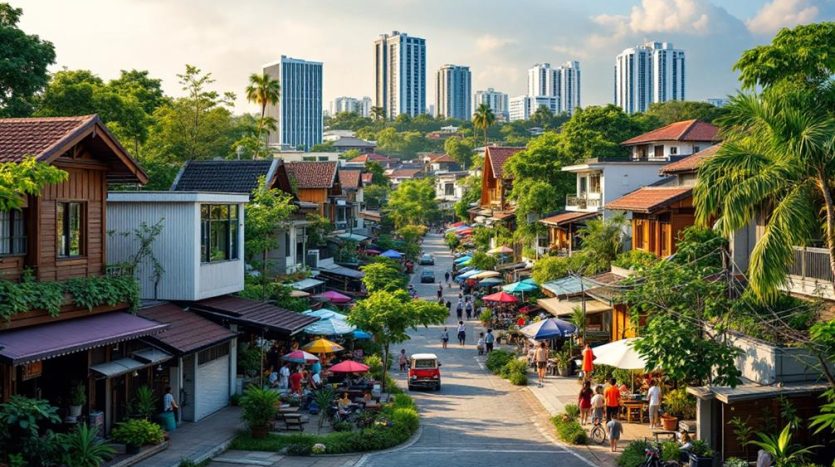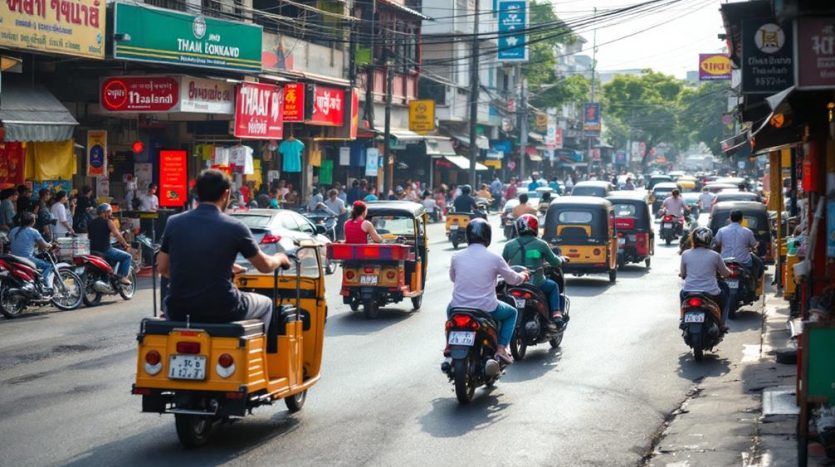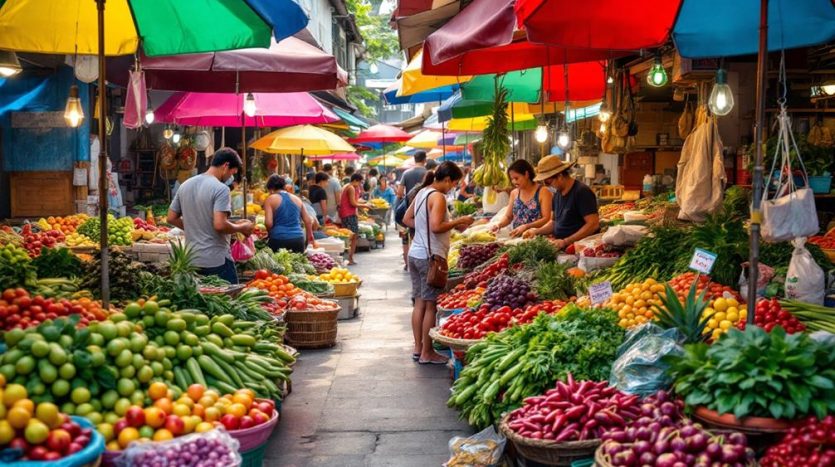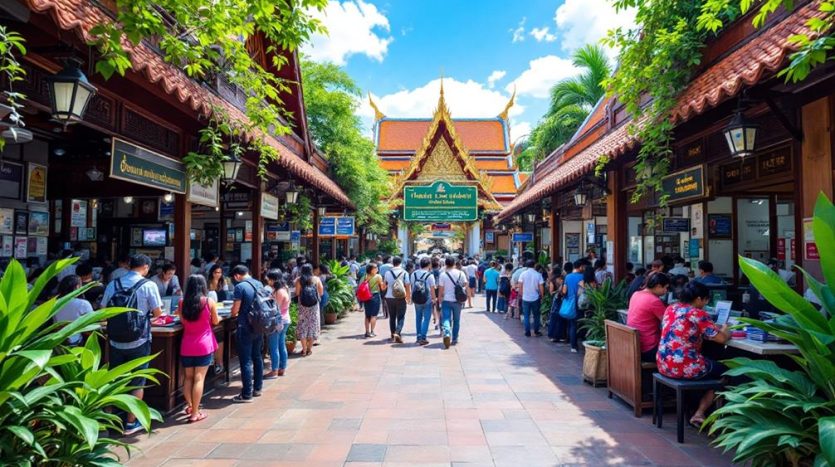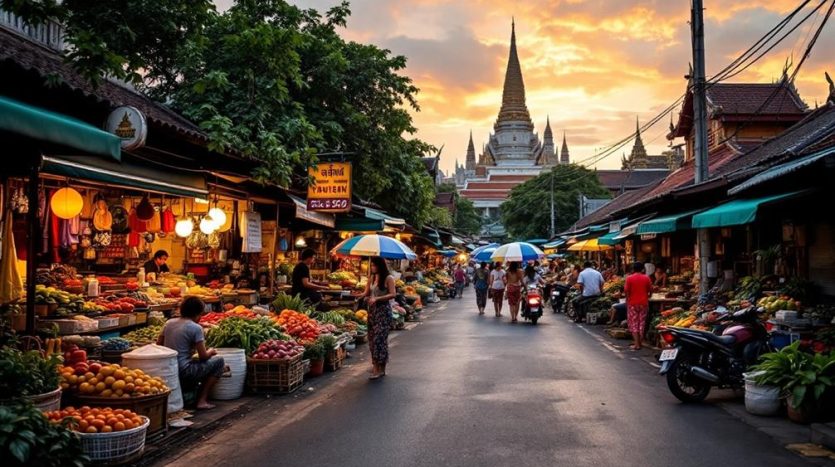Is It Really Cheap to Live in Thailand?
You've likely heard that living in Thailand is a bargain compared to Western countries, with affordable housing, cheap food, and low-cost healthcare. But is it really that simple? Sure, Thailand offers a range of budget-friendly options, from street food to cozy rentals, but costs can vary widely depending on where and how you choose to live. The bustling streets of Bangkok present a different financial landscape compared to the serene beaches of Phuket. So, while Thailand may seem like a financial paradise, there are layers to explore before deciding if it's truly as cheap as it seems.
Key Takeaways
- Housing in Thailand is affordable, with property prices lower than in major Western cities.
- Street food and local grocery shopping offer budget-friendly dining options.
- Public transportation and motorbike rentals provide cost-effective travel solutions.
- Healthcare expenses are low, with quality care and medical tourism benefits.
- Regional cost variations exist, with urban areas typically more expensive than rural ones.
Cost of Housing
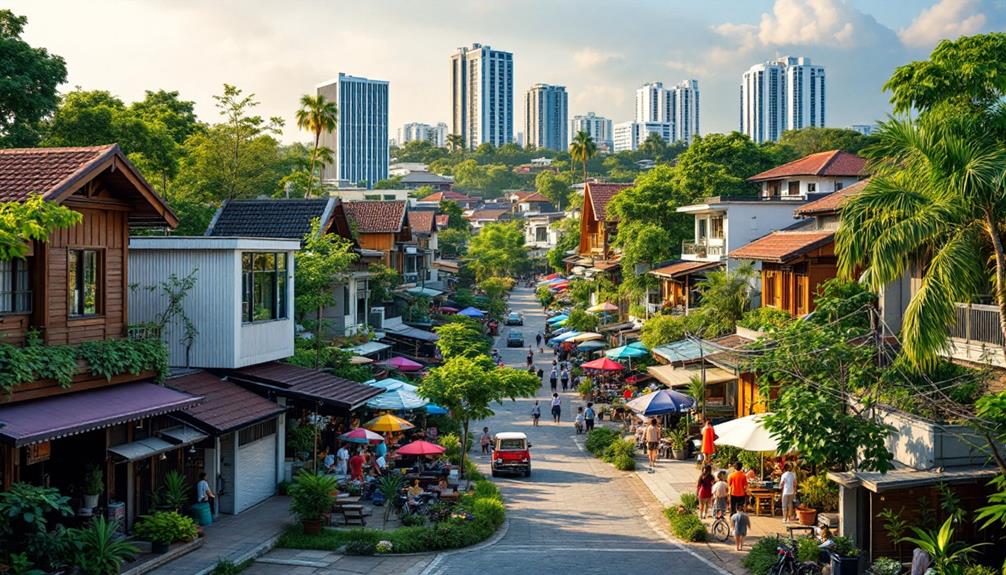
When considering a move to Thailand, you'll find that the cost of housing is particularly affordable, making it an attractive option for many.
Whether you're an expat housing hunter or just someone who adores a good bargain, the rental markets in Thailand offer a plethora of choices. You can find anything from a cozy condo in bustling Bangkok to a quaint bungalow by the beach. And guess what? You won't have to sell any organs to afford them!
Rental markets cater to a variety of tastes and budgets, with property prices that make your wallet breathe a sigh of relief. For the price of a shoebox apartment in New York, you could live like a king—or at least a duke—somewhere tropical.
Housing types range from modern high-rises to traditional Thai homes, ensuring you've got options galore.
Before you start packing, remember to check if your future abode comes with air conditioning or if you'll need to embrace the local sweat lifestyle.
Food and Dining Expenses
When you're living in Thailand, you'll find street food to be not only delicious but also remarkably budget-friendly, making it a staple for many residents.
Grocery shopping in local markets can help you save considerably compared to Western countries, allowing you to enjoy fresh produce without breaking the bank.
Dining out at restaurants offers a wide range of prices, so setting a realistic budget will guarantee you can enjoy the diverse Thai cuisine while keeping your expenses in check.
Street Food Affordability
Exploring Thailand's vibrant street food scene is not just a culinary adventure but also a financially savvy choice for travelers and locals alike. With an incredible street food variety, you'll taste everything from spicy papaya salad to sweet mango sticky rice, all while diving into rich cultural experiences. As you stroll through bustling local markets, remember that these culinary explorations are not only affordable but often healthier than you might think—just watch out for that extra chili.
Here's a quick affordability comparison to help you navigate:
| Dish | Average Cost (Baht) | Portion Size |
|---|---|---|
| Pad Thai | 40-60 | Generous |
| Som Tam (Papaya Salad) | 30-50 | Moderate |
| Mango Sticky Rice | 50-70 | Sweet Satisfaction |
| Chicken Satay | 10-20 per skewer | Snackable |
| Tom Yum Soup | 60-100 | Filling |
While prices vary, street food is always a budget-friendly option. Just remember to stick to stalls with a steady stream of locals for better food safety. And don't forget your street vendor etiquette—smile, point, and maybe learn a Thai phrase or two! After all, food tourism is both an art and a science.
Grocery Shopping Costs
Maneuvering grocery shopping in Thailand can be both an economical and culturally enriching experience. Picture yourself steering through bustling local markets with a keen eye for organic produce. It's cheaper than you might think, but let's not forget—price comparison is your new superpower. Here's how you can master the art:
- Local Markets vs. Supermarkets: Local markets offer seasonal discounts and fresher options, while supermarkets might tempt you with imported goods. Balance is key.
- Bulk Buying: Embrace this shopping habit for rice, noodles, and other staples. It's like getting a VIP pass to savings land.
- Dietary Preferences & Sustainability: Align your grocery list with sustainability practices. It's like giving Mother Earth a high-five while sticking to your budget.
Budget planning is essential when you're surrounded by exotic fruits and veggies that scream, "Buy me!"
But humor yourself—resist the urge to splurge on durians unless they're a dietary preference. By adopting smart shopping habits, you'll not only save money but also support local farmers.
Dining Out Budget
Dining in Thailand is a rich tapestry of flavors and experiences that won't break the bank if navigated wisely. Picture yourself savoring local cuisine at a bustling street market, where meal pricing is so wallet-friendly, you'll feel like you've hacked the system.
With dining options ranging from humble food stalls to expat favorites with a twist of Thai flair, there's something for every palate and budget.
When it comes to restaurant culture, you'll find that Thailand's laid-back atmosphere extends to tipping practices. Good news for your pocket: tips aren't mandatory, but a small gesture of rounding up the bill is appreciated.
As for food quality, even the simplest noodle stand might surprise you with its culinary prowess, so don't shy away from experimenting.
If you're feeling lazy, food delivery services are your best friends. With a few taps, you can enjoy a five-star dining experience from your couch.
Keep in mind, though, that your eating habits may evolve—spicy curries and pad thais have a sneaky way of becoming daily staples.
Transportation Costs
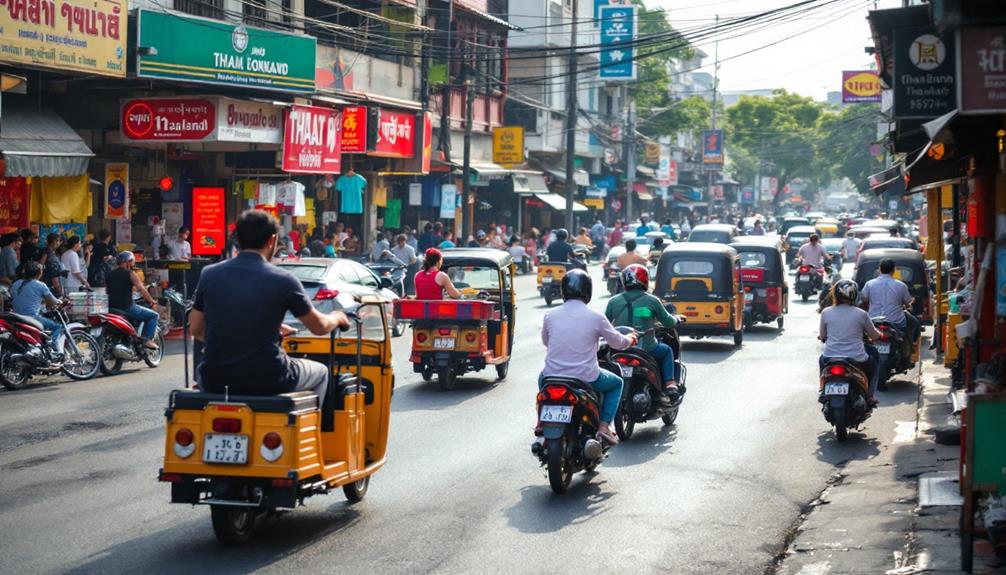
Maneuvering Thailand's transportation system can be both affordable and efficient, making it easy on your wallet.
Whether you're catching public transportation or haggling over taxi fares, there are plenty of options to zip around without breaking the bank. Here are some cost-effective choices:
- Public Transportation: The BTS and MRT are your best friends in Bangkok. Inexpensive travel passes make them unbeatable for traversing the city while enjoying air conditioning that rivals an arctic tundra.
- Ride Sharing Apps: Grab and Bolt are popular here, providing a safe and affordable alternative to traditional taxis. Just beware of traffic conditions that could transform a quick trip into a prolonged meditation session.
- Motorbike Rentals: If you're brave enough to dance with Bangkok's traffic, renting a motorbike is cheap. Watch out, though; transportation safety isn't exactly a priority for some drivers.
For those who prefer a slower pace, bicycles are an eco-friendly option with minimal costs.
If you're jetting off, airport transfers won't require a second mortgage. Fuel prices are generally low, but always check before committing to a grand road trip.
Healthcare Expenses
Maneuvering Thailand's healthcare landscape reveals a system that offers both affordability and quality, especially appealing for expats and retirees.
You'll find that healthcare quality here doesn't skimp on excellence despite the lower costs compared to Western countries. Hospitals are well-equipped, and medical staff are often trained abroad. Insurance options abound, catering to every need, from the cautious penny-pincher to the "I want a gold-plated stethoscope" type.
Thailand's medical tourism is booming like a tuk-tuk after a downhill race. Folks flock here for everything from dental work to complex surgeries, lured by the promise of exceptional care at a fraction of the price.
Plus, with alternative therapies and traditional medicine, you can get your chakras aligned while sipping tea made from herbs you can't pronounce.
Preventive care is big in Thailand, so you'll find yourself encouraged to stay healthy rather than just fix what's broken. Emergency services are efficient, and expat health is taken seriously, with many hospitals having international departments.
Just remember, a little health insurance goes a long way; it'll save you from unexpected costs and give you peace of mind, even if you're just here for the pad thai.
Utilities and Internet

When you settle into your new life in Thailand, you'll quickly discover that utilities and internet expenses are generally kind to your wallet.
But there are a few quirks you should know about to make sure you're not left in the dark—literally.
Here's what you need to contemplate:
1. Utility Bills: You'll find your utility bills are quite affordable.
However, be mindful of your energy consumption, especially with air conditioning.
You might be tempted to turn your home into a winter wonderland, but your wallet (and the environment) will thank you for restraint.
2. Internet Providers: Thailand offers a range of internet providers with varying internet speeds and service reliability.
Choose wisely, or you might find your Zoom calls turning into a slideshow.
On the bright side, you'll have time to appreciate the art of buffering.
3. Water Supply & Waste Disposal: These are generally reliable, though occasional power outages can briefly disrupt your water supply.
It's a good excuse to practice your rain dance or take up the ancient art of bucket showers.
Embrace these quirks with a sense of humor, and you'll find living in Thailand both cost-effective and entertaining.
Entertainment and Leisure
Once you've got your utilities sorted and you're ready to embrace the vibrant lifestyle Thailand has to offer, it's time to explore entertainment and leisure options that won't break the bank.
Whether you're a fan of adrenaline-pumping outdoor adventures or you prefer sipping a cocktail while watching the sun dip below the horizon, Thailand's got you covered. Your entertainment budget can stretch surprisingly far here.
For cultural activities, immerse yourself in local festivals like Songkran and Loy Krathong, where you can soak up traditions without soaking your wallet.
If nightlife options are your thing, Bangkok and Chiang Mai offer lively scenes that won't require a second mortgage. You can dance the night away or catch a live band for just a few baht.
Recreational facilities such as gyms and pools are affordable, and for sports events, catching a Muay Thai match is a must-do cultural experience.
For those who enjoy leisure travel, hop on a budget-friendly bus or train and explore Thailand's stunning landscapes and beaches.
Shopping and Groceries
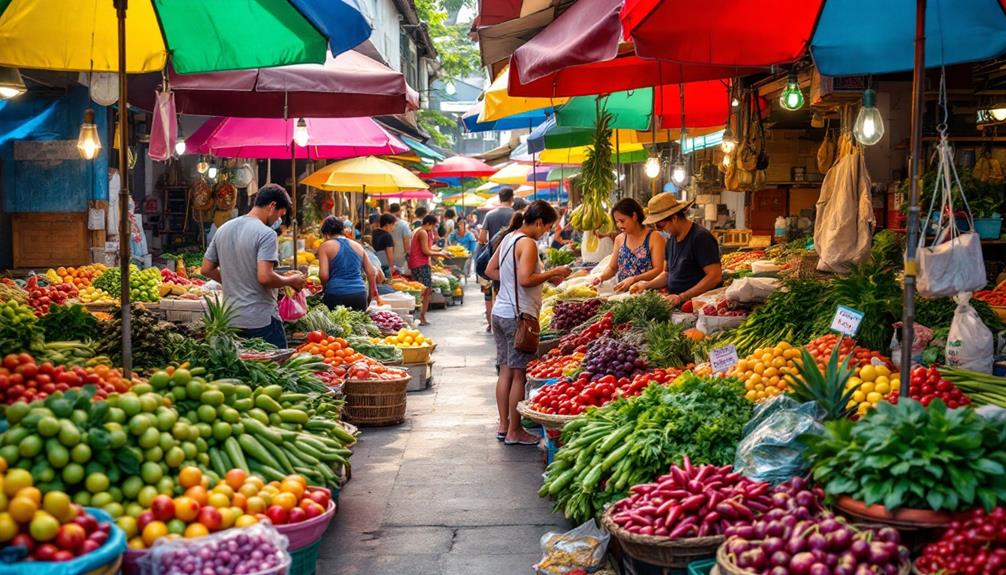
Steering through the world of shopping and groceries in Thailand is an exciting journey that promises both value and variety.
Whether you're maneuvering bustling local markets or perusing the aisles of expat shops, there's a delightful array of options to suit every budget and taste.
Let's plunge into some shopping tips:
1. Local Markets: Embrace your inner bargain hunter. Not only can you find seasonal produce at a fraction of supermarket prices, but you'll also enjoy the freshest fruits and veggies.
Plus, haggling is practically a national sport!
2. Bulk Purchasing: Channel your inner squirrel and stock up. Buying in bulk, especially for staples like rice and noodles, can save you a ton.
Just make sure your cooking habits can keep up with your pantry expansion.
3. Online Grocery: Feeling lazy? Online grocery shopping is your new best friend.
You can compare prices with a click, and the delivery folks will even brave the traffic for you.
Education and Schooling
When considering education in Thailand, you'll find a stark difference between public and private schools, both in cost and quality.
International schools, while offering high standards and varied curriculums, can be a significant financial commitment.
It's crucial to weigh these options carefully to align educational goals with your budget and expectations.
Public vs. Private Schools
Education in Thailand presents a dynamic landscape of choices between public and private schools, each with unique financial implications and cultural experiences. Steering through this can feel like a game of educational chess, but don't worry—here's your playbook.
1. Curriculum Differences and Teacher Qualifications: Public schools often follow the national curriculum with teachers who may excel in local knowledge but face language barriers. Private schools might offer international curricula with more qualified teachers, but remember, it comes with hefty school fees.
2. Extracurricular Activities and School Facilities: Public schools might leave you scratching your head over the state of their facilities.
Private institutions, on the other hand, roll out the red carpet with swanky gyms and clubs for every hobby, from pottery to ping pong.
3. Parental Involvement and Cultural Integration: Public schools foster strong community ties and cultural integration, but don't expect a lot of hand-holding.
Private schools often have a reputation for being more engaging with parents, but your role might just be writing checks.
Ultimately, weigh academic performance against your wallet's weight and your child's needs. Choose wisely, future Valedictorian's parent!
Cost of International Schools
As you navigate the educational landscape in Thailand, international schools stand out as a premium option, promising a global perspective but often accompanied by a price tag that can strain your budget. With a buffet of international curriculums and polished school facilities, these schools cater to expat communities seeking exceptional academic performance and extracurricular activities. But beware—tuition fees can often mimic a small mortgage.
To help you visualize potential costs, here's a table of average fees in Bangkok:
| Feature | Average Cost (USD) | Remarks |
|---|---|---|
| Tuition Fees (per year) | $10,000 – $25,000 | Don't faint, please |
| School Facilities | $1,000 – $3,000 | Air-con included, usually |
| Extracurricular Activities | $500 – $1,500 | Piano lessons, anyone? |
| School Transportation | $500 – $1,200 | Say goodbye to taxi woes |
Teacher qualifications are generally high, ensuring your child gets a well-rounded education. Language programs are robust, often allowing students to become mini-polyglots. Yet, school reputation and the social perks for your child could make it worth the investment. While the fees might make your wallet cry, consider the potential boost in academic performance and the global opportunities that may follow—just don't forget to budget for that transportation shuttle.
Education Quality and Standards
In steering through the intricacies of education quality and standards in Thailand, you'll find that the system is a blend of traditional values and modern methodologies. While evaluating this, consider the following:
- Curriculum Differences: Thai schools often mix local traditions with international elements, creating a unique, if sometimes confusing, educational cocktail. It's like trying to mix a Thai iced tea with a latte—not always a smooth blend.
- Teacher Qualifications and Student Performance: Teacher qualifications vary considerably, which can impact student performance. It's akin to betting on a tuk-tuk race with unpredictable outcomes—exciting but a bit of a gamble.
- Educational Resources and Technology Access: Schools have differing access to resources and technology. Some institutions are tech-savvy, while others make do with chalkboards and hope.
Language barriers and cultural integration are critical factors, particularly for expats. Extracurricular activities provide a great way for students to bridge these gaps, offering cultural insight through fun, engaging experiences.
School safety is generally solid, but always check the parental involvement level—it's the secret sauce to successful education.
Visa and Residency Fees
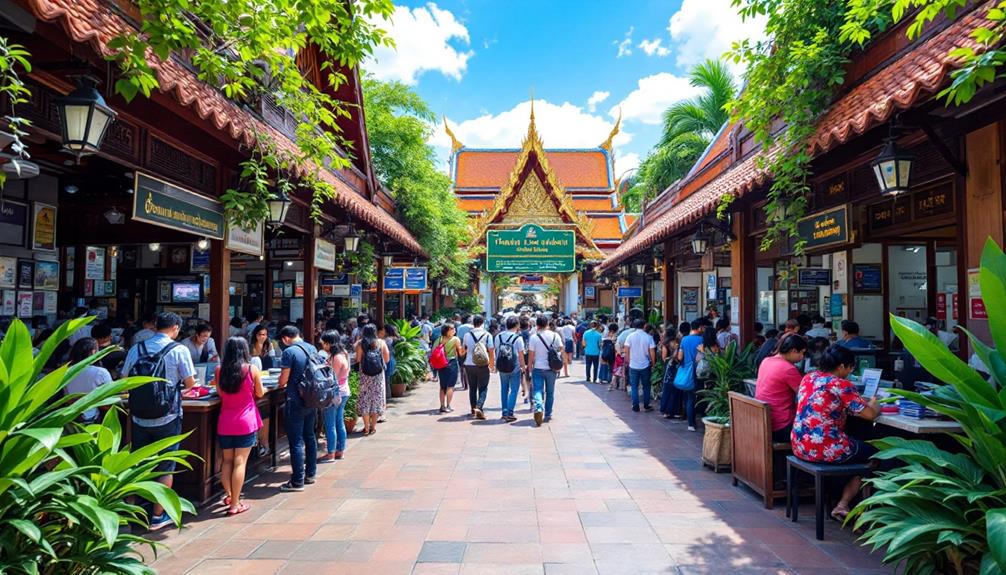
Maneuvering the visa and residency fees in Thailand is an essential step for anyone considering a long-term stay in this vibrant country. With various visa types available, including travel visas, retirement visas, and marriage visas, you're spoiled for choice like a kid in a candy store. But unlike candy, these come with application processes and renewal fees.
Want to work in Thailand? Grab a work permit, but remember, it's not as simple as flashing a smile and saying "sawadee." The paperwork could rival a small novel. For those considering retirement or settling down with a Thai sweetheart, explore residency options that might just make your heart (and wallet) sing.
Here's a quick snapshot of common visa costs:
| Visa Type | Application Fee (THB) | Renewal Fee (THB) |
|---|---|---|
| Travel Visa | 1,000 | 1,900 |
| Retirement Visa | 2,000 | 1,900 |
| Marriage Visa | 2,000 | 1,900 |
Navigating these waters takes more than just Googling "Thailand visa" and hoping for the best. You'll need a mix of financial savvy, cultural insight, and maybe a touch of humor to keep your spirits high when dealing with Thai bureaucracy.
Regional Cost Variations
Having tackled the intricacies of visa and residency fees, it's time to focus on the regional cost variations that can greatly impact your budget when living in Thailand. You might think Thailand's affordability is a one-size-fits-all deal, but surprise—it's more like a buffet of financial surprises.
Here's what you'll need to contemplate:
1. Urban vs. Rural: In bustling Bangkok, you'll pay premium prices for cultural experiences and regional amenities.
Venture to rural areas, and your wallet might thank you, but your craving for city conveniences might not.
2. Expat Communities: Popular expat hubs like Chiang Mai can have inflated costs due to demand.
However, they offer familiar comforts and robust expat communities that can make the shift smoother.
3. Tourism Impact: High-season in tourist hotspots like Phuket can send prices soaring.
Reflect on seasonal variations—your lifestyle choices might mean you're paying summer rates for a winter experience.
Local economies play a huge role in these cost differences.
While your bank account might be happier in a less touristy locale, don't forget that each region offers unique cultural experiences.

